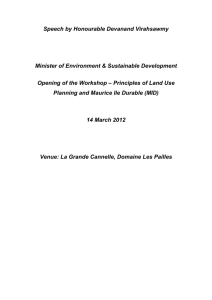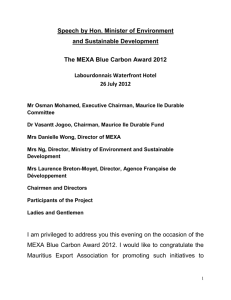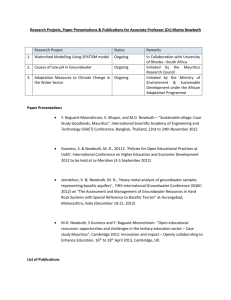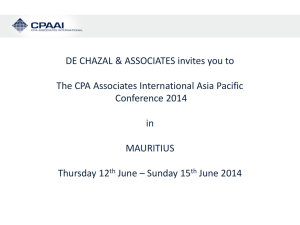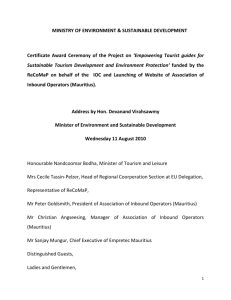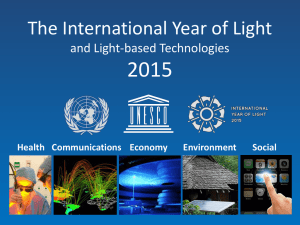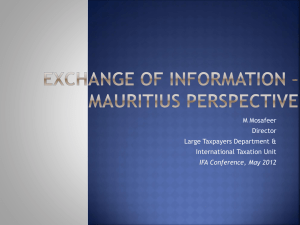14.03.27 MoU-Japan International Cooperation Agency
advertisement
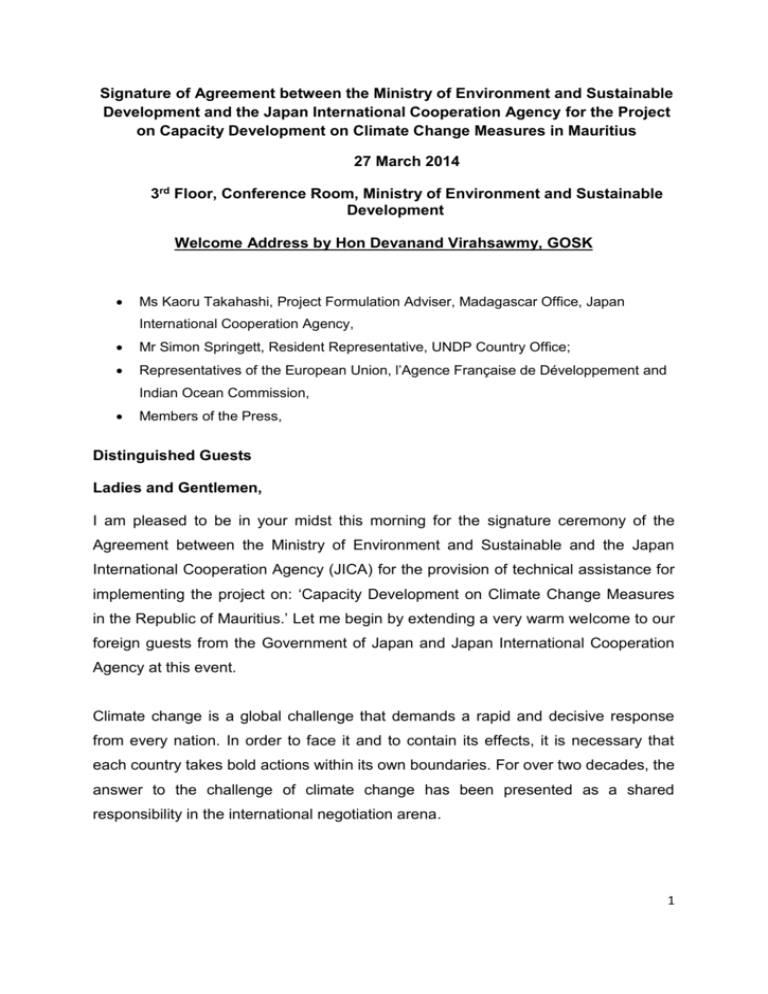
Signature of Agreement between the Ministry of Environment and Sustainable Development and the Japan International Cooperation Agency for the Project on Capacity Development on Climate Change Measures in Mauritius 27 March 2014 3rd Floor, Conference Room, Ministry of Environment and Sustainable Development Welcome Address by Hon Devanand Virahsawmy, GOSK Ms Kaoru Takahashi, Project Formulation Adviser, Madagascar Office, Japan International Cooperation Agency, Mr Simon Springett, Resident Representative, UNDP Country Office; Representatives of the European Union, l’Agence Française de Développement and Indian Ocean Commission, Members of the Press, Distinguished Guests Ladies and Gentlemen, I am pleased to be in your midst this morning for the signature ceremony of the Agreement between the Ministry of Environment and Sustainable and the Japan International Cooperation Agency (JICA) for the provision of technical assistance for implementing the project on: ‘Capacity Development on Climate Change Measures in the Republic of Mauritius.’ Let me begin by extending a very warm welcome to our foreign guests from the Government of Japan and Japan International Cooperation Agency at this event. Climate change is a global challenge that demands a rapid and decisive response from every nation. In order to face it and to contain its effects, it is necessary that each country takes bold actions within its own boundaries. For over two decades, the answer to the challenge of climate change has been presented as a shared responsibility in the international negotiation arena. 1 The main objective of the National Climate Change Adaptation Policy Framework for the Republic of Mauritius is to foster the development of policies, strategies, plans and processes to avoid, minimize and adapt to the negative impacts of climate change on the key sectors namely, water, agriculture including terrestrial ecosystem, fisheries and marine ecosystem as well as tourism and coastal management and also to prevent damage to human settlements and infrastructure and loss of lives. One of the key policy principles of the Framework is to ensure that all segments of our society are adequately informed on climate change, including the risks involved and the impacts on our economy, but more importantly on the role of the community in building resilience against climate change. Ladies and Gentlemen Latest scientific reports confirm that climate change indicators are in the ‘red’. Carbon dioxide concentration reached 400 parts per million in May 2013. According to the latest World Risk Report, 2012, Mauritius is among the top 15 countries with the highest disaster risk (ranked 13) and is ranked 7th on the list of countries most exposed to natural hazards. As mentioned in Article 6 of the United Nations Framework Convention on Climate Change (UNFCCC), calls on governments to educate, empower and engage all stakeholders and major groups on activities relating to climate change have to be proceeded. For this purpose, Climate Change Education (CCE) and public awareness are among the most effective, durable and long term solution to combat climate change and bring a change in the mindset of citizen with regard to risks mitigation and adaptation at the individual, family and community levels. A Climate Change Information, Education and Communication Strategy and Action Plan has already been developed to inform all citizens in combating and adapting to climate change. The target is to sensitize 400,000 citizens by the year 2016 and 1 million people by the year 2020. 2 As part of the action plan, the following developments have been achieved: a) a Training Manual for Youth on Climate Change; and b) a Toolkit containing 111 Actions for Youth to help Combat Climate Change in Mauritius Climate change poses several challenges to every sector in the Mauritian society; attending to them requires an effective and coherent coordination with other countries. Since, Japan have dedicated programmes on Climate Change Education (CCE) my Ministry has made a request to the Government of Japan through the Japan International Cooperation Agency (JICA) for support with a view to strengthen the capacity development of the Republic of Mauritius to deal with climate change issues. We are grateful to the JICA for providing assistance to the on-going project on coastal protection and for accepting further assistance for the capacity development on Climate Change Measures in Mauritius to enhance Climate Change Education and Public Awareness activities. Coastal zone is one of the most complex and productive ecosystem of this planet. As well as providing habitat to various species, it also make up for significant benefits for the society as well as the natural ecosystems. Indeed, the coastal zone of Mauritius generates annual revenue of Rupees 1 trillion and is considered to be a key pillar of our economy. Unfortunately, our coastal and marine resources, upon which our country is so dependent, is being threatened due land and sea-based activities and is also particularly vulnerable to the adverse effects of climate change. The damaging results are the degradation of the coastal ecosystems, exacerbated beach erosion and poor water quality. In view of ensuring the protection of our natural resources and of our fragile coastal ecosystem, my Ministry had approached the Japanese Government for Technical Assistance for the implementation of the “Capacity Development in Coastal Protection and Rehabilitation in Mauritius” project, to which the Government of Japan had responded positively. The overall goal of the project is to formulate a “Coastal 3 Conservation Plan” which will deal with the erosion issues in a holistic and integrated manner taking into consideration adaptative and preventive measures to be adopted, and therefore meet the expectations of the Government of Mauritius. The project started in May 2012 and is expected to be completed in 2015. The JICA team of experts have already carried out extensive surveys and baseline data collection. The findings of their surveys have been compiled in the first Progress Report which was presented on the 17th June 2013. 12 coastal sites have been selected for coastal conservation and recovery plan. Out of the 12 sites, 7 sites, including Grand Sable and Pointe d’Esny, have been chosen as demonstration sites and for capacity building purposes. Ladies and Gentlemen The huge challenge of climate change demands urgent consideration through the development of adaptation measures, policies and capacity building. The Government of Japan, through JICA, has renewed the regional cooperation by providing technical assistance for the implementation of the ‘Capacity Development on Climate Change Measures in the Republic of Mauritius.’ JICA will also donate equipment meant for strengthening CCE and awareness raising as well as provide training to stakeholders in Mauritius and in Japan. The experts will assist the relevant stakeholders in preparing materials. The duration of the project will be two years and the cost is estimated at USD 800,000. 4 Experts will be recruited by JICA to work on these two activities and JICA will provide equipment as well as training to our concerned organisations. With a view to better coordinate and monitor the implementation of the recommended policies and activities on climate change, a Project Steering Committee will be set up under the chairmanship of the Permanent Secretary of my Ministry. The Committee will comprise, amongst others, representatives of the Prime Minister’s Office (Mauritius Meteorological Services), MID Commission, the Ministry of Energy and Public Utilities, the Ministry of Finance and Economic Development, the Ministry of Public Infrastructure, National Development Unit, Land 4 Transport and Shipping, Ministry of Housing and Lands, Ministry of Education and Human Resources, the Ministry of Agro Industry and Food Security, the Ministry of Fisheries, the Ministry of Local Government and Outer Islands, the Ministry of Tourism and Leisure, the Ministry of Gender Equality, Child Development and Family Welfare, the Mauritius Oceanography Institute, the Mauritius Institute of Education, the Agricultural Research Extension Unit, the University of Mauritius and the Mauritius Council of Social Services. Before concluding, I would like once again to express my gratitude to all national stakeholders and partners supporting us in this crucial combat. Addressing climate change requires a comprehensive and a multi-disciplinary approach. If we want to successfully reduce the risks posed by climate change, we will need the full commitment and involvement of everyone. With these few words, I thank you once again ladies and gentlemen for attending today’s panel discussion and I look forward to a fruitful exchange of ideas to enrich the ongoing national debate on climate change. I thank you for your attention. 5
